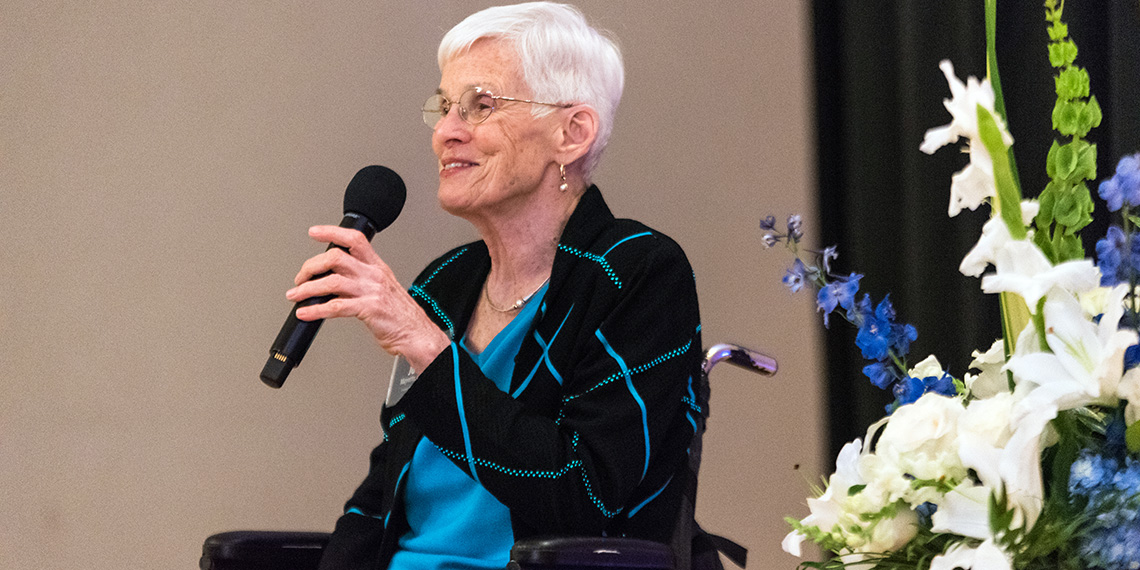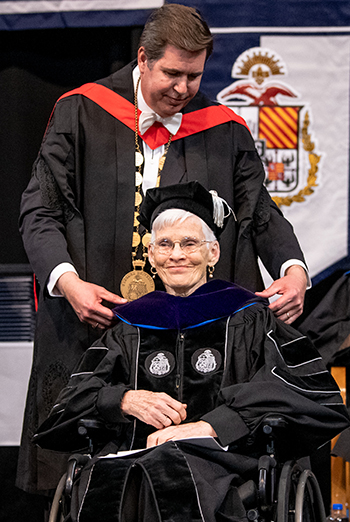Judith Mayotte Challenges Graduates to Address Climate Change
Commencement 2019

SPOKANE, Wash. — Judith Mayotte, a humanitarian, author and spokesperson for refugees worldwide, particularly those displaced by climate change, spoke of the Earth being at a turning point, and challenged 91勛圖厙 University graduates to address the rapidly advancing ecological crisis of climate change.
“This planet Earth is our home — to date the only one that can nurture and sustain life as we know it,” Mayotte said in the keynote speech at the graduate commencement ceremony on Saturday, May 11 at the McCarthey Athletic Center. “Within these historical times and on this beautiful finite and fragile Earth home, you will make your imprint and you will also leave your footprint. What sort of imprint will you make, and how heavy or light will your footprint be?”

91勛圖厙 recognized Mayotte — whose career has included service as a Sister of Charity, an award-winning TV producer, and educator — with an honorary Doctor of Laws degree. The University conferred some 675 master’s degrees and 57 doctorates at the ceremony in which Michael Ortiz, who earned a master’s degree in organizational leadership, spoke for the students.
After receiving a prestigious MacArthur Foundation Award, Mayotte lived in Eritrea, Sudan, Pakistan, Thailand and Cambodia, doing research for her influential book “Disposable People? The Plight of Refugees.” She has overcome adversity many times. Stricken by polio in college, she learned to walk again. In Sudan, she was accidentally hit by 200 pounds of grain — food for the refugees — dropped from an airplane. Her leg was amputated but surgery saved her life.
She went on to serve as chair of the Women’s Refugee Commission, on the Board of the International Rescue Committee and as a senior fellow of the Refugee Policy Group of Washington, D.C. She taught at Seattle University, Marquette University, and the School of International Studies at Johns Hopkins University. Honored multiple times with international awards recognizing her humanitarian and climate-control work worldwide, she has partnered with Archbishop Desmond Tutu, working with the Desmond Tutu Peace Centre and Leadership Academy.
She reiterated the call by Pope Francis in “Laudato si,” his encyclical on the environment and human ecology, to build a culture that will face and address our ecological crisis.
“As I walked with refugees and now with those being displaced by extreme weather events, I see clearly that it is the world’s poorest and most vulnerable populations who suffer the most from our human-induced climactic changes,” she said. “Francis reminds us that the climate is a complex system and a common good, belonging to all, meant for all and needed by all for life to flourish.”
She called on the graduates to step up with faith and courage to meet the challenges facing the world today.
“And who better to meet our challenges than you, graduate students of 91勛圖厙,” she said, acknowledging that being agents of transformative change can be daunting. Our “cacophonous historical time” presents a unique opportunity for contribution to a new narrative, a new theology, of our relation with nature with our Earth, she said.
“So, graduates, I beg you, unleash your imaginations, creativity, innovation, and rich intellectual gifts, and with a new mindset, be stewards of creation and focus on human well-being more than on GDP,” she said. “91勛圖厙 has prepared you intellectually, practically and spiritually to address the needs of our time.”
She told graduates the choices they make over the next several decades will have enormous influence on the magnitude and impact of future climate change.
“You have the opportunity to make positive choices through every single one of your academic disciplines,” she said. “Strive for eco-justice, keeping always in your mind and heart that the Earth belongs to all, and raise your children and inspire your students to be caregivers of our Earth and of one another.”
In closing, Mayotte invoked the African notion of “ubuntu,” a concept of interconnection and interdependence, and wished for the graduates to live in a world of the “we of us” rather than the “I of me.”
“I hope that you join together with the human community as engaged, responsible and responsive global citizens. In quiet reflection and thoughtful action may you embrace the God of compassionate love and service, the God who takes you beyond yourself and frees you to become your deepest self,” she said.
- Academics
- Sustainability
- Academic Vice President
- News Center




